NEWS VOICES
Welcome to News Voices, a weekly feature where members of the WVIA News team will talk with each other — and sometimes sources — about key things we've learned in recent stories we have been working on.
Today Roger DuPuis sits down with Sarah Hofius Hall to discuss recent stories she has written about teacher shortages in Pennsylvania, and how officials are working to address that challenge.
***
ROGER: You're listening to Morning Edition here on WVIA radio. I'm Roger DuPuis, and this is News Voices. Today. I have with me WVIA News reporter Sarah Hofius Hall.
SARAH: Hi, Roger.
ROGER: Hi, Sarah. Great to have you here.
SARAH: Great to be here.
ROGER: So I understand that, according to a new report, there is a significant teacher shortage here in Pennsylvania. Can you tell me about that?
SARAH: Superintendents have told me that 10 years ago, 20 years ago, they would have maybe 100 applicants for one teaching job, and now sometimes they put out an advertisement for a teaching job, and don't receive any applicants at all. Nobody is certified in that specific subject area who wants to teach in that district, so they have to rely more and more on people with emergency certifications. So that means, while they have a bachelor's degree, it might be in something completely unrelated to teaching. So these classrooms, they're staffed. They have someone in the front of the room, but it may not be somebody who is highly qualified to teach. Just this week, PA Needs Teachers and Teach Plus put out a report that found that the state needs an additional 8,500 teachers just to be hired to fill vacancies and to replace teachers in the classroom now who have emergency permits and not traditional certification.
ROGER: Right. Now Sarah, you have been an education reporter now for a very long time. Is this the worst that you have seen the teacher shortage here in Pennsylvania?
SARAH: Definitely over the last couple years, we've heard people talk about it more and more, but we're also now seeing programs put in place to try to get people excited to enter the profession again.
ROGER: Right. And you just wrote about one of those programs that is taking place in Luzerne County.
SARAH: Yeah. Wilkes-Barre Area School District a few years ago started a program called the education experience program. So it allows high school seniors —they have about a dozen in the program right now — to spend their senior year rotating, you know, a different placement each quarter, but spending half their day taking traditional classes at the high school, and the other half a day with different classroom teachers in different schools, different subject areas, really being immersed in the teaching world.
ROGER: Right. Why is that important, Sarah?
SARAH: People are just trying to get kids excited about being a teacher and why it is such an important profession. Sure, it is a hard job. Teachers these days face things that teachers didn't face 10 years ago, 20 years ago, but they're really trying to get kids in the classroom seeing how important the job is and the difference they can make.
ROGER: And I want to come back to one of the other stories that you've recently written about this. But before I do that, what are some of the impediments? What are some of the things that are standing in the way of young people getting into the teaching profession?
SARAH: It's everything from pay to concerns about burnout and stress. So during the pandemic, it really put a lot of stress on teachers. They were in their dining rooms, maybe trying to teach a class virtually, and we saw, I think the stress had been building, but that was really a moment that kind of brought more attention to the issues teachers face.
ROGER: One of the stories that you wrote within the past few weeks is about how Luzerne County Community College and Commonwealth University of Pennsylvania have created something called the Grow Your Own model. Tell us about that.
SARAH: Yes, so the two schools, Luzerne County, community college and Commonwealth University, have come together for a very unique partnership that will allow students to get their first two years from the community college while staying in Hazleton so going to the Hazleton center, and then Commonwealth University comes in and either teaches classes at the Hazleton center or online. These students can do their observations in the Hazleton Area School District. They can student teach in the school district. And then the hope is that these students will want to stay in the city and then teach in Hazleton, so they can really, for the first time, not have to leave Hazleton to become a teacher.
ROGER: Sounds excellent to me, Sarah. Thank you for being here.
SARAH: Thank you.
READ MORE ABOUT THIS ISSUE:



